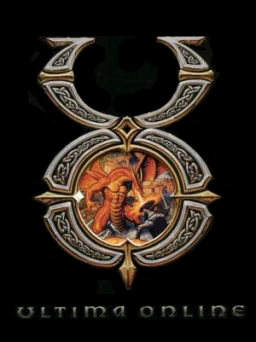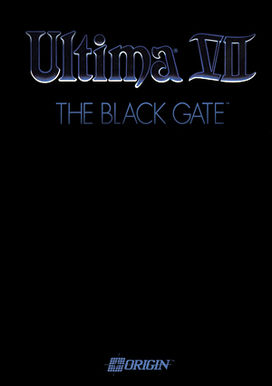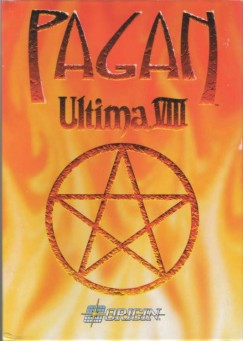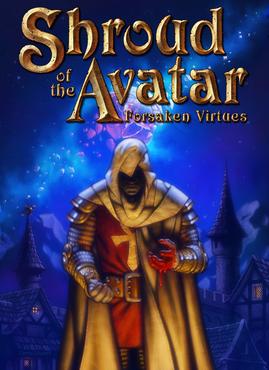A massively multiplayer online role-playing game (MMORPG) is a video game that combines aspects of a role-playing video game and a massively multiplayer online game.

Ultima is a series of open world fantasy role-playing video games from Origin Systems, created by Richard Garriott. Electronic Arts has owned the brand since 1992. The series had sold over 2 million copies by 1997.

Ultima Online (UO) is a fantasy massively multiplayer online role-playing game (MMORPG) released on September 24, 1997 by Origin Systems.

Richard Allen Garriott is a British-born American video game developer, entrepreneur and private astronaut.

Origin Systems, Inc. was an American video game developer based in Austin, Texas. It was founded on March 3, 1983, by Richard Garriott and his brother Robert. Origin is best known for their groundbreaking work in multiple genres of video games, such as the Ultima and Wing Commander series. The company was purchased by Electronic Arts in 1992.
Player versus player (PvP) is a type of multiplayer interactive conflict within a game between human players. This is often compared to player versus environment (PvE), in which the game itself controls its players' opponents. The terms are most often used in games where both activities exist, particularly MMORPGs, MUDs, and other role-playing video games, to distinguish between gamemodes. PvP can be broadly used to describe any game, or aspect of a game, where players compete against each other. PvP is often controversial when used in role-playing games. In most cases, there are vast differences in abilities between players. PvP can even encourage experienced players to immediately attack and kill inexperienced players. PvP is often referred to as player killing in the cases of games which contain, but do not focus on, such interaction.
Scott Jennings, also known as Lum the Mad, is an American commentator on MMORPG games. He is best known for creating a website, The Rantings of Lum The Mad, a pioneer blog, which existed from 1998 to 2001, when Jennings was hired by MMO developer Mythic Entertainment, where he remained until 2006.
Ultima Worlds Online: Origin (UWO:O) — originally titled Ultima Online 2 (UO2) — was to be the first sequel to the popular 1997 massively multiplayer online role-playing game Ultima Online. Origin Systems revealed that they were developing UO2 in September 1999 for release within a year or two, but development was cancelled on March 21, 2001.

Ultima IV: Quest of the Avatar, first released in 1985 for the Apple II, is the fourth in the series of Ultima role-playing video games. It is the first in the "Age of Enlightenment" trilogy, shifting the series from the hack and slash, dungeon crawl gameplay of its "Age of Darkness" predecessors towards an ethically-nuanced, story-driven approach. Ultima IV has a much larger game world than its predecessors, with an overworld map sixteen times the size of Ultima III and puzzle-filled dungeon rooms to explore. Ultima IV further advances the franchise with dialog improvements, new means of travel and exploration, and world interactivity.

Ultima VI: The False Prophet, released by Origin Systems in 1990, is the sixth part in the role-playing video game series of Ultima. It is the third and final game in the "Age of Enlightenment" trilogy. Ultima VI sees the player return to Britannia, at war with a race of gargoyles from another land, struggling to stop a prophecy from ending their race. The player must help defend Britannia against these gargoyles, and ultimately discover the secrets about both lands and its peoples.

Ultima VII: The Black Gate is the seventh installment of the Ultima series of role-playing video games, released in April 1992. In it, the player returns as The Avatar, a would-be paragon of moral virtue who faces down many dangers and deceptions in order to cleanse the medieval fantasy world of Britannia of assorted plots and schemes, monster infestations, and the undermining of crown authority.

Ultima VIII: Pagan is a role-playing video game, released as the eighth part of the Ultima series. Released in 1994, it is a DOS-only title and is also the first game in the series to be rated M in North America. It was not as well-received as its predecessors, Ultima VII and Ultima VII Part Two: Serpent Isle.

Ultima IX: Ascension is the ninth and final part of the main series of the role-playing video game series Ultima. Developed by Origin Systems and published by Electronic Arts, Ultima IX was released in 1999 for Microsoft Windows after years in development hell. Following the Avatar's escape from Pagan, he is transported back to Britannia for one final battle with the Guardian, who is increasingly ruining the physical and moral fabric of that land by the use of eight columns. The Avatar must fight his way to the runes of virtue found in each of the columns, and cleanse them in the shrines of Virtue, then face off against the Guardian himself.

Raphael "Raph" Koster is an American entrepreneur, game designer, and author of A Theory of Fun for Game Design. Koster is widely recognized for his work as the lead designer of Ultima Online and the creative director behind Star Wars Galaxies. From 2006 until 2013 he worked as the founder and president of Metaplace producing a Facebook game platform.

Ultima Online: The Second Age was the first expansion for the Ultima Online MMORPG. The expansion added several features to the game, including a new region called the Lost Lands, new creatures, and support for player-built cities.
The history of massively multiplayer online games spans over thirty years and hundreds of massively multiplayer online games (MMOG) titles. The origin and influence on MMO games stems from MUDs, Dungeons & Dragons (D&D) and earlier social games.

Portalarium, Inc. was a video game developer based in Austin, Texas that was formed in September 2009 by Richard Garriott, together with his longtime game industry partners, Dallas Snell and Fred Schmidt. Portalarium marks Richard Garriott's first return to the video game industry since the release of his 2007 title Tabula Rasa. The name "Portalarium," as well as the company's motto, "We take you there," are intended as a continuity and reference to Garriott's prior two companies' names and respective mottoes; Origin Systems, "We Create Worlds," and Destination Games, "We have arrived."

Shroud of the Avatar: Forsaken Virtues is a fantasy role-playing video game. Described as being a spiritual successor to the Ultima series, Shroud of the Avatar was developed by Austin, Texas-based developer Portalarium, with a team led by Richard Garriott as creative director, Starr Long as executive producer, Chris Spears as lead technical designer, and Tracy Hickman as lead story designer. It is currently maintained by Catnip Games.
Nine full expansion packs for the massively multiplayer online role-playing game Ultima Online have been released. The first, Ultima Online: The Second Age, arrived in 1998. The most recent expansion pack is Ultima Online: Time of Legends (2015).












